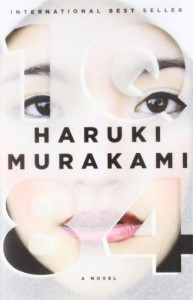Case's Book Blog
I love reading sci-fi, fantasy, dystopian and eutopian literature. I also read technical books related to software development.
Just My Type: A Book about Fonts
 Large swaths of this book are excellent. There are a few chapters I could have done without, such as the chapter on font personality quizzes, but overall, this is a good introduction to many different fonts. I read the ebook and was pleasantly surprised to see so many of the fonts actually embedded in the file. In a few cases there were rendering artifacts caused by this, but it wasn't terribly distracting. There was a bit of trouble with the editing, however. Every new chapter had a set of run-on words between the first and second page which would have been caught by anyone reading the text, so I'm not sure how that was left in. In any case, worth a read as an easy to get into intro to type.
Large swaths of this book are excellent. There are a few chapters I could have done without, such as the chapter on font personality quizzes, but overall, this is a good introduction to many different fonts. I read the ebook and was pleasantly surprised to see so many of the fonts actually embedded in the file. In a few cases there were rendering artifacts caused by this, but it wasn't terribly distracting. There was a bit of trouble with the editing, however. Every new chapter had a set of run-on words between the first and second page which would have been caught by anyone reading the text, so I'm not sure how that was left in. In any case, worth a read as an easy to get into intro to type.
Madness (Keeper, #2)
 Not as stellar as the first one. I was somewhat annoyed by how much of the book's plot was contingent on whining about the events that happened in the first book. Blah.But! Once you get past that there's an interesting story here, so I will be continuing on to read the third book in the series.
Not as stellar as the first one. I was somewhat annoyed by how much of the book's plot was contingent on whining about the events that happened in the first book. Blah.But! Once you get past that there's an interesting story here, so I will be continuing on to read the third book in the series.
 Ah, the life and times of a snarky asshat teenager. But as a superhero/villain! What more could you want?Clean prose, lively characters, and an enjoyable plot make this sequel an excellent follow-up to the original. I'm definitely looking forward to reading more about Damien's misadventures in Golden City.
Ah, the life and times of a snarky asshat teenager. But as a superhero/villain! What more could you want?Clean prose, lively characters, and an enjoyable plot make this sequel an excellent follow-up to the original. I'm definitely looking forward to reading more about Damien's misadventures in Golden City.
Spin
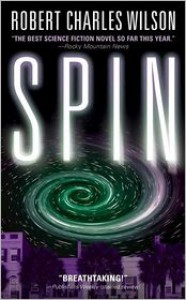 This was a long and deep book. The writing was fluid and the story was interesting. The characters were...familiar. The social topics were interesting, and the speculations seemed prescient to me. So yes, a five star book. Go get it.
This was a long and deep book. The writing was fluid and the story was interesting. The characters were...familiar. The social topics were interesting, and the speculations seemed prescient to me. So yes, a five star book. Go get it.
 This was another fun novel from the author of the excellent web comic "A Girl and Her Fed". This book is not like the "Rachel Peng" novel I read a few months ago - there's a lot more NSFW moments!Entertaining though. I enjoyed it as a lazy sunday morning read.
This was another fun novel from the author of the excellent web comic "A Girl and Her Fed". This book is not like the "Rachel Peng" novel I read a few months ago - there's a lot more NSFW moments!Entertaining though. I enjoyed it as a lazy sunday morning read.
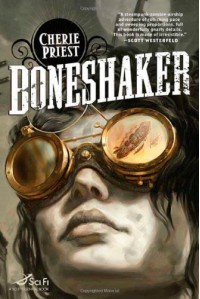 This is a dark and sad tale set in Seattle. It's good, but the mood is so despondent throughout almost the entire book that it is a bit overwhelming. The saving grace is that some of the characters are full of sufficient vigor to pull you through.
This is a dark and sad tale set in Seattle. It's good, but the mood is so despondent throughout almost the entire book that it is a bit overwhelming. The saving grace is that some of the characters are full of sufficient vigor to pull you through.
 The main character is a vampire. And an asshole. I dunno, I love it. I'm sure everyone is comparing this to the Dresden series, as the writing style and genre (Urban fantasy) is fairly similar. It's not quite as clean prose as the Dresden series, but definitely worth a read for entertainment purposes.
The main character is a vampire. And an asshole. I dunno, I love it. I'm sure everyone is comparing this to the Dresden series, as the writing style and genre (Urban fantasy) is fairly similar. It's not quite as clean prose as the Dresden series, but definitely worth a read for entertainment purposes.
 I learned from this book that vagrant really is quite simple! This was a quick book to read through, and it seems to be a complete survey of the features available.Some of the book was a bit repetitive, and if you already know how to work with linux, you won't need to pay great attention to a fair bit of it, but I think it is aimed at the entire user base of vagrant, and should work for just about anyone.I think my next trick will be to read through a book on chef, since that is the next part of the stack that has complexity I don't yet understand how to use to its fullest.
I learned from this book that vagrant really is quite simple! This was a quick book to read through, and it seems to be a complete survey of the features available.Some of the book was a bit repetitive, and if you already know how to work with linux, you won't need to pay great attention to a fair bit of it, but I think it is aimed at the entire user base of vagrant, and should work for just about anyone.I think my next trick will be to read through a book on chef, since that is the next part of the stack that has complexity I don't yet understand how to use to its fullest.
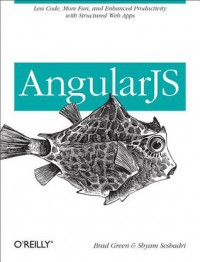 An excellent and thorough introduction to AngularJS. I'd recommend going through the tutorial on the home page of AngularJS's site first to get some context, then read this. It's easy to read from beginning to end, and chock full of useful information.
An excellent and thorough introduction to AngularJS. I'd recommend going through the tutorial on the home page of AngularJS's site first to get some context, then read this. It's easy to read from beginning to end, and chock full of useful information.
 Fun and interesting romp through a world of computer-aided sensory input. Possibly the most likely actual outcome, and if not, fun to imagine.I enjoyed the inclusion of the maker community.
Fun and interesting romp through a world of computer-aided sensory input. Possibly the most likely actual outcome, and if not, fun to imagine.I enjoyed the inclusion of the maker community.
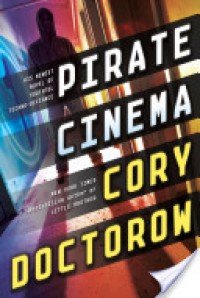 If you haven't yet read Free Culture by Lawrence Lessig, you can read this book instead. It's the same tract, just turned into fiction. The characters and story do help keep you interested though, as they are both compelling. There are definitely passages where entire paragraph arguments are pulled out of Free Culture into Pirate Cinema, and spoken by the characters to each other. This can be a bit awkward at times.I guess my biggest complaint with this book is that it is positioning itself as a dystopian future 10-15 years out, but the sole conflict of this dystopian future has already happened, and we lost. I personally feel like the era of free pirating, free culture, free video is already over. We've moved into the land where big media owns everything, there's fuck-all we can do about it, and nobody cares. And it is simultaneously better and worse than imagined here. Worse because we don't even notice it, and better because we don't even notice it.This book is about one of my worst fears...getting my net cut off! Not enough people realize how scary that is. So read this book to learn.
If you haven't yet read Free Culture by Lawrence Lessig, you can read this book instead. It's the same tract, just turned into fiction. The characters and story do help keep you interested though, as they are both compelling. There are definitely passages where entire paragraph arguments are pulled out of Free Culture into Pirate Cinema, and spoken by the characters to each other. This can be a bit awkward at times.I guess my biggest complaint with this book is that it is positioning itself as a dystopian future 10-15 years out, but the sole conflict of this dystopian future has already happened, and we lost. I personally feel like the era of free pirating, free culture, free video is already over. We've moved into the land where big media owns everything, there's fuck-all we can do about it, and nobody cares. And it is simultaneously better and worse than imagined here. Worse because we don't even notice it, and better because we don't even notice it.This book is about one of my worst fears...getting my net cut off! Not enough people realize how scary that is. So read this book to learn.
 It makes me sick to my stomach that our culture can so easily be manipulated and owned by so few. Read this book if you can handle how corrupted and disgusting our own history and legal system are with respect to intellectual property.
It makes me sick to my stomach that our culture can so easily be manipulated and owned by so few. Read this book if you can handle how corrupted and disgusting our own history and legal system are with respect to intellectual property.
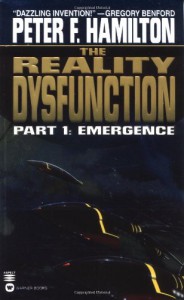 These books are fun. At first I was under the impression that they were typical space opera. The next thing I knew we were exorcising demons. What more do you need to know?
These books are fun. At first I was under the impression that they were typical space opera. The next thing I knew we were exorcising demons. What more do you need to know?
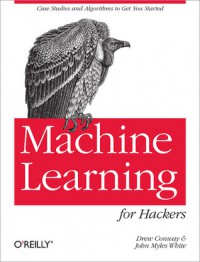 In Machine Learning for Hackers by Drew Conway and John Myles White, the reader is introduced to a number of techniques useful for creating systems that can understand and make use of data. While the book has solid topical material and is written in a fluid and easy to read manner, I don't feel that this book is really for hackers, unless the definition of hacker is vastly different from "programmer". Much of the text is taken up explaining how to parse strings, change dates, and otherwise munge data into shape to be operated on by statistical functions provided by R. In fact, there is so much of the book in that fashion that I end up skipping through large portions to get back to something that is worth spending time reading about. I can't understand why a programmer would need significant education in string parsing. I was also put off by the vast amount of text explaining basic statistics. Maybe a recent computer science graduate is simply the wrong reader for this book? I think it is certainly possible to learn the basic principles of machine hacking from this book, and even to put them to good use with R in the same manner displayed in the examples. Indeed, the code and data available for this book would be very useful as prep for an introductory course at an academic institution. To make the best use of the text, you really should be sitting at your computer, reading the text side by side with the code, and operating on the data with R as instructed to do.Personally, I found that wading through this text wasn't enjoyable it due to the lack of density of material at the depth I was looking for. Other readers may find it is just right for them, but I suspect those readers would not be hackers, contrary to the implication of the title. As best as I can figure, this book would best serve a student scientific researcher who wanted to understand what machine learning was about, and did not have significant prior experience in programming or statistics. Alternatively, if you are significantly distant in years from your time in statistics, or considered learning R one of your goals, this book could work well for you.If this sounds like you, you can get it from O'Reilly. I wrote this post as part of their O'Reilly Blogger Review program, which is neat.
In Machine Learning for Hackers by Drew Conway and John Myles White, the reader is introduced to a number of techniques useful for creating systems that can understand and make use of data. While the book has solid topical material and is written in a fluid and easy to read manner, I don't feel that this book is really for hackers, unless the definition of hacker is vastly different from "programmer". Much of the text is taken up explaining how to parse strings, change dates, and otherwise munge data into shape to be operated on by statistical functions provided by R. In fact, there is so much of the book in that fashion that I end up skipping through large portions to get back to something that is worth spending time reading about. I can't understand why a programmer would need significant education in string parsing. I was also put off by the vast amount of text explaining basic statistics. Maybe a recent computer science graduate is simply the wrong reader for this book? I think it is certainly possible to learn the basic principles of machine hacking from this book, and even to put them to good use with R in the same manner displayed in the examples. Indeed, the code and data available for this book would be very useful as prep for an introductory course at an academic institution. To make the best use of the text, you really should be sitting at your computer, reading the text side by side with the code, and operating on the data with R as instructed to do.Personally, I found that wading through this text wasn't enjoyable it due to the lack of density of material at the depth I was looking for. Other readers may find it is just right for them, but I suspect those readers would not be hackers, contrary to the implication of the title. As best as I can figure, this book would best serve a student scientific researcher who wanted to understand what machine learning was about, and did not have significant prior experience in programming or statistics. Alternatively, if you are significantly distant in years from your time in statistics, or considered learning R one of your goals, this book could work well for you.If this sounds like you, you can get it from O'Reilly. I wrote this post as part of their O'Reilly Blogger Review program, which is neat.

